
Department of Personnel has issued consolidated Instructions on Casual labour appointment and wages and Leave entitlement
No.49014/5/2019/Estt.(C)
Government of India
Ministry of Personnel, PG & Pensions
Department of Personnel & Training
North Block. New Delhi
Dated: 13th February,2020
OFFICE MEMORANDUM
Subject: Consolidated instruction on Casual Labour- reg.
The undersigned is directed to refer to the subject mentioned above and to say that various instructions have been issued by the Government from time to time regarding casual labourers. All such instructions issued till date and still in vogue have been consolidated under easily comprehensible headings for the facility of reference and placed at Annexure to this O.M. All Ministries/Departments are requested to bring the above guidelines to the notice of all concerned.
(Umesh Kumar Batia)
Deputy Secretary to the Government of India
Consolidated Instructions on Casual labour
ANNEXURE
A.CASUAL LABOURER
1.Appointment:
1.1. Persons on daily wages (casual workers) should not be recruited for work of regular nature.
1.2. Recruitment of daily wagers may be made only for work which is casual or seasonal or intermittent nature or for work which is not of full time nature, for which regular posts cannot be created.
1.3. The work presently being done by regular staff should be reassessed by the administrative Departments concerned for output and productivity so that the work being done by the casual workers could be entrusted to the regular employees. The Departments may also review the norms of staff for regular work and take steps to get them revised.
[O.M. No.49014/2/86-Estt(C) dated 07.06.1988]
[O.M. No.49014/1/2017-Estt(C) dated 04.09.19]
1.4. It has been observed that in spite of strict guidelines on engagement of Casual Labourer vide the above referred 0.M, various Ministries/ Departments continue to engage casual workers for attending work of regular nature against the Government’s policies. It is, therefore, reiterated that all Ministries/ Departments may ensure strict compliance of the guidelines on engagement of Casual Labourers. Negligence in the matter of implementing these guidelines should be viewed seriously and brought to the notice of the appropriate authorities for taking prompt and suitable action against the defaulters.
[O.M. No.49019/1/95-Estt(C) dated 14.06.2016]
2.Pay/wages:
2.1 Where the nature of work entrusted to the casual workers and regular employees is the same, the casual workers may be paid at the rate of 1/30th of the pay at the minimum of the relevant pay scale plus dearness allowance for work of 8 hours a day.
2.2. In cases where the work done by a casual worker is different from the work done by a regular employee, the casual worker may be paid only the minimum wages notified by the Ministry of Labour and Employment or the State Government/ Union Territory Administration, whichever is higher, as per the Minimum Wages Act, 1948. However, if a Department is already paying daily wages at a higher rate, the practice could be continued with the approval of its Financial Adviser.
[O.M. No.49014/2/86-Estt(C) dated 07.06.1988] and [0.M. No.49014/1/2017-Estt(C) dated 04.09.19]
3.Leave:
3.1. The casual workers may be given one paid weekly off after six days of continuous work.
3.2. The payment to the casual workers may be restricted only to the days on which they actually perform duty under the Government with a paid weekly off as mentioned above. In addition, they will also be paid for a National. Holiday, if it falls on a working day for the casual workers.
[O.M. No.49014/2/86-Estt(C) dated 07.06.1988]
3.3. It has further been decided that casual workers working in offices having a five day week may be allowed one day paid weekly off provided they have worked for a minimum of 40 hours during the said week.
[O.M. No.49019/1/95-Estt(C) dated 14.06.2016]
B.SCHEME OF 1993 (Grant of Temporary Status and Regularisation of Casual Labourer)
1.Eligibility:
1.1. This scheme was applicable to casual labourers in employment of the Ministries /Departments of Government of India and their attached and subordinate offices, on the date of issue of these orders. But it shall not be applicable to casual workers in Railways, Department of Telecommunication and Department of Posts who are already governed by their own separate schemes.
1.2. Temporary status was to be conferred on all casual labourers who are in employment on the date of issue of this OM and who have rendered a continuous service of at least one year, which means that they must have been engaged for a period of at least 240 days (206 days in the case of offices observing 5 days week).
1.3. Such conferment of temporary status was to be without reference to the creation /availability of regular (erstwhile) Group posts.
1.4. Conferment of temporary status on a casual labourer did not involve any change in his duties and responsibilities. The engagement was on daily rates of pay on need basis. He might be deployed anywhere within the recruitment unit/territorial circle on the basis of availability of work.
1.5. Such casual labourers who acquire temporary status will, however, not be brought on to the permanent establishment unless they are selected through regular selection process for (erstwhile) Group posts.
[O.M. No.51016/2/90-Estt(C) dated 10.09.1993]
2.Benefits:
2.1. Wages at daily rates with reference to the minimum of the pay scale for a corresponding regular (erstwhile) Group ‘D’ official including DA and HRA.
2.2. Benefits of increments at the same rate as applicable to a (erstwhile) Group ‘D’ employee would be taken into account for calculating pro-rata wages for every one year of service subject to performance of duty for at least 240 days (206 days in administrative offices observing 5 days week) in the year from the date of conferment of temporary status.
2.3. Leave entitlement would be on a pro-rata basis at the rate of one day for every 10 days of work. Casual or any other kind of leave, except maternity leave, will not be admissible. They will also be allowed to carry forward the leave at their credit on their regularisation. They will not be entitled to the benefits of encashment of leave on termination of service for any reason or on their quitting service.
2.4. Maternity leave to lady casual labourers as admissible to regular Group ‘D’ (erstwhile) employees was to be allowed.
2.5. 50% of the service rendered under temporary status would be counted for the purpose of retirement benefits after their regularisation.
2.6. After rendering three years’ continuous service after conferment of temporary status, the casual labourers would be treated on par with temporary (erstwhile) Group ‘D’ employees for the purpose of contribution to the General Provident Fund, and would also further be eligible for the grant of Festival Advance /Flood Advance on the same conditions as are applicable to temporary erstwhile Group ‘D’ employees, provided they furnish two sureties from permanent Government servants of their Department.
2.7. Until they are regularized, they would be entitled to Productivity Linked Bonus/ Adhoc bonus only at the rates as applicable to casual labourers.
2.8. No benefits other than those specified above was to be admissible to casual labourers with temporary status.
[O.M. No.51016/2/90-Estt(C) dated 10.09.1993]
3.Conditions for regularisation:
3.1 Two out of every three vacancies in Group ‘D’ (erstwhile) (and now Group ‘C’) cadres in respective offices where the casual labourers have been working was to be filled up as per extant recruitment rules and in accordance with the instructions issued by Department of Personnel and Training from amongst casual workers with temporary status. However, regular Group ‘Dlerstwhile) staff rendered surplus for any reason will have prior claim for absorption against existing/future vacancies. They would be allowed age relaxation equivalent to the period for which they have worked continuously as casual labourer.
[O.M. No.51016/2/90-Estt(C) dated 10.09.1993]
3.2 Following the acceptance of the recommendation of the 6th CPC, all Group D posts had been upgraded to Group C posts. Recruitment to erstwhile Group `Dr posts placed in Group ‘C’, PB-1, Grade Pay ‘1800/- (non technical as MT Staff) is now made only through Staff Selection Commission and minimum educational qualification for appointment is Matriculation or ITI pass. Regularisation of CL-TS therefore, could not be done by the Ministries/ Departments on their own and requires relaxation of para¬8 of the Appendix to the O.M. dated 10.09.1993 by D/o Personnel 85 Training with the concurrence of Department of Expenditure.
[O.M. No.49014/3/2014-EsttiC) dated 16.10.2014]
4.Clarifications regarding the Scheme of 1993:
4.1.

[O.M. No.49014/2/93-Estt(C) dated 12.07.1994]
4.2. The hon’ble Supreme Court while hearing SLP (Civil) No. 2224/2000) in the case of Union of India Es Anr. Vs. Mohan Pal etc. had directed that:- “The Scheme of 10-9-93 is not an ongoing Scheme and the temporary status can be conferred on the casual labourers under that Scheme only on fulfilling the conditions incorporated in clause 4 of the scheme, namely, they should have been casual labourers in employment on the date of the commencement of the scheme and they should have rendered continuous service of at least one year i.e. at least 240 days in a year or 206 days (in case of offices having 5 days a week). We also make it clear that those who have already been given ‘temporary’ status on the assumption that it is an ongoing Scheme shall not be stripped of the ‘temporary’ status pursuant to our decision”. The Supreme Court in the above case had also considered the question as to whether the services of casual labourers who had been given ‘temporary status could be dispensed with as per clause 7 as if they were regular casual labourers and observed that- The casual labourers who acquire ‘temporary’ status cannot be removed merely on the whims and fancies of the employer. If there is sufficient work and other casual labourers are still to be employed by the employer for carrying out the work, the casual labourers who have acquired ‘temporary’ status shall not be removed from service as per clause 7 of the Scheme. If there is serious misconduct or violation of service rules, it would be open to the employer to dispense with the services of a casual labourer who had acquired the ‘temporary’ status.
[O.M. No.40011/6/2002-Estt(C) dated 06.06.2002]
C.REGULARISATION OF IRREGULARLY APPOINTED WORKERS (in light of Uma Devi Judgement’
A Constitution bench of the Supreme Court in civil appeal No. 3595-
3612/1999 etc. in the case of Secretary State of Karnataka and Ors. Vs. Uma Devi and others has reiterated that any public appointment has to be in terms of the Constitutional scheme. However, the Supreme Court in para 44 of the aforesaid judgement dated 10.4.2006 had directed that the Union of India, the State Governments and their instrumentalities should take steps to regularize as a one time measure the services of such irregularly appointed, who are duly qualified persons in terms of the statutory recruitment rules for the post and who have worked for ten years or more in duly sanctioned posts but not under cover of orders of courts or tribunals. The Apex Court has clarified that if such appointment itself is in infraction of the rules or if it is in violation of the provisions of the Constitution, illegality cannot be regularized.
[O.M. No.49019/1/2006-Estt(C) dated 11.12.20061
NOTE: Both the scheme of 1993 and Regularisation in light of Uma Devi Judgement were one time measure and no other scheme/ instructions have been issued by DoPT other than the above (Pares. B & C) for the regularisation of Casual labourers.
D: ADDITIONAL BENEFITS TO THE CASUAL LABOURERS WITH TEMPORARY STATUS (CL-TS) IN CONTINUATION OF SCHEME OF 1993.
1.Allowance /Leave Benefits:
1.1 The benefit of Transport allowance was extended to casual labourers having temporary status vide DoPT’s D.M. No. 49014/3/97-Estt(C) dated 01.08.1998. Physically handicapped casual labourers having temporary status were entitled to transport allowance at double the normal rate subject to terms and conditions in M/o Finance, Di° Expenditure’s C.M. No. 19029/1/78-E-IV dated 31.08.78.
[O.M. No.49014/2/2008-Estt(C) dated 04.08.2008]
1.2 It was clarified that the limit on accumulation of total number of days of leave will be 300 days as in the case of regular Government employees. In other words CL-TS can accumulate leave upto a maximum of 300 days only.
[O.M. No.49014/3/2007-Estt(C) dated 18.10.2007]
1.3 Paternity leave as admissible to regular Government employees was also extended to the casual labourers with temporary status and who has less than two surviving children may be granted Paternity leave for a period of 15 days during the confinement of his wife. During the period of such leave he shall be paid wages drawn immediately before proceeding on leave.
1.4 Paternity leave was not to be debited against the leave account and could be combined with pro-rata earned leave admissible to casual employees under “Casual Labourers (Grant of Temporary Status and regularisation) Scheme of Government of India, 1993.”
[O.M. No.49014/1/98-Estt(C) dated 01.04.19981
1.5. Casual employees who have been granted temporary status were entitled to Transport Allowance for computation of their daily rates of wages.
[O.M. No.49014/3/97-Estt(C) dated 01.04.1998]
2.GPF and pensionary benefits:
2.1 The casual labourers who had been granted temporary status under the scheme, and had completed 3 years of continuous service after that, were entitled to contribute to the General Provident Fund. It was also decided that 50% of the service rendered under temporary status would be counted for the purpose of retirement benefits in respect of those casual labourers who have been regularised in terms of para 8 of the OM dated 10.09. 1993. This was applicable to all casual labourers covered under the scheme of 1993 whether they were regularised before or after 31.12.2003.
2.2. Regarding the modalities of transfer of the amount lying in the NPS account to the GPF account of these casual labourers, Controller General of Accounts (CGA) have furnished following clarifications:
(i)Adjustment of Employees contribution in Accounts:- Amount may be credited to individual’s GPF Account and the account may be recanted permitting up-to-date interest (Authority-FR-16 & Rule 11 of GPF Rules)
(ii) Adjustment of Government contribution under NPS in Accounts:- To be accounted for as () Dr. to object heads 70-Deduct Recoveries under major Head 2071- Pension and other Retirement benefit-Minor Head 911- Deduct Recoveries of over payment (GAR 35 and para 3.10 of List of Major and Minor Heads of Accounts)
(iii) Adjustment of increased value of subscription on account of appreciation of investment- may be accounted for by crediting the amount to Govt. account under M.H.0071- Contribution towards Pensions and other Retirement Benefits 800- Other Receipts (Note under the above Head in LMMHA).
2.3. If the benefits under old pension scheme are to be allowed to a retired employee, who had contributed towards NPS at any stage, the entire NPS accumulations i.e. employee’s contribution + Government’s matching contribution + appreciation thereon should be remitted into the accredited bank of the PAO concerned.
[O.M. No.49014/2/2014-Estt(C)-Pt-I dated11.10.2018],
[O.M. No.49014/2/2014-Estt(C) dated 28.07.2016] and
[O.M. No.49014/2/2014-Estt(C) dated 26.02.2016]
3.Pay/Wages as per 7th CPC:
On the implementation of the recommendations of the 7th Central Pay Commission as per Government of India Notification dated 25th July, 2016, the Casual Labourers with Temporary Status will continue to receive their wages with effect from 01.01.2016 as per provisions of the Casual Labours (Grant of Temporary Status 85 Regularisation) Scheme, worked out on the basis of the pay scales of Group ‘C’ as per Level 1 of the Pay Matrix recommended by the 7th Central Pay Commission and approved by the Government provided they are matriculate. In case of the similarly placed non- matriculate Casual Labourers with Temporary Status the above benefit of wages w.e.f. 01.01.2016 may be extended only after imparting the requisite training, by the respective administrative Ministries/ Departments on the lines indicated in the MOF O.M. No. 1/1/2008-IC dated 24.12.2008.
Get Free Email Updates
Follow us on Telegram Channel, Twitter & Facebook and Whatsapp Channel for all Latest News and Updates

